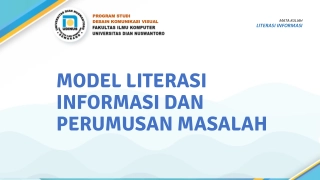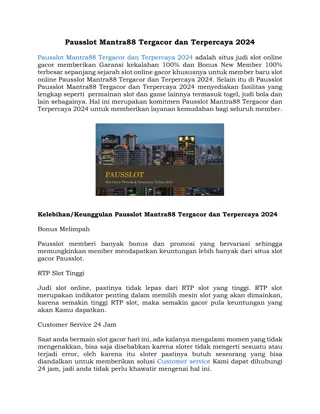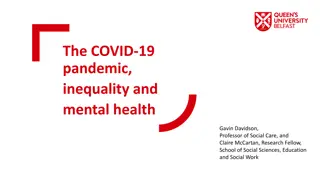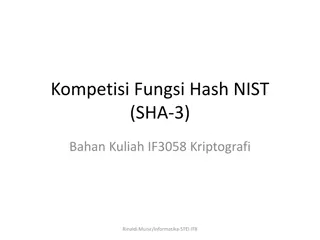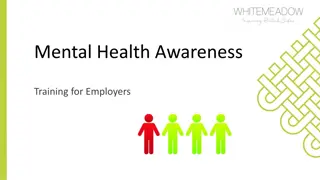
Role of Dr. Dan Chisholm in Global Mental Health Research
Dr. Dan Chisholm from the WHO Headquarters in Geneva, Switzerland plays a significant role in advancing global mental health through research projects like EMERALD and EMILIA. His work focuses on improving mental health systems in low- and middle-income countries, developing intervention guides, and assessing care pathways for conditions like schizophrenia. Through innovative tools and multi-country studies, his contributions help enhance mental health services worldwide.
Download Presentation

Please find below an Image/Link to download the presentation.
The content on the website is provided AS IS for your information and personal use only. It may not be sold, licensed, or shared on other websites without obtaining consent from the author. If you encounter any issues during the download, it is possible that the publisher has removed the file from their server.
You are allowed to download the files provided on this website for personal or commercial use, subject to the condition that they are used lawfully. All files are the property of their respective owners.
The content on the website is provided AS IS for your information and personal use only. It may not be sold, licensed, or shared on other websites without obtaining consent from the author.
E N D
Presentation Transcript
THE ROLE AND CONTRIBUTION OF Dr Dan Chisholm HEALTH SERVICES & SYSTEMS RESEARCH Department of Mental Health and Substance Use, WHO Headquarters Office Geneva, Switzerland TO GLOBAL MENTAL HEALTH
EPSILON GUESS THE ACRONYM EMERALD EMILIA 2
EPSILON European Psychiatric Services: Inputs linked to Outcome Domains and Needs HEALTH SERVICES & HEALTH SYSTEMS RESEARCH PROJECTS EMERALD Emerging mental health systems in low- and middle-income countries EMILIA E-mhGAP Intervention Guide in Low-and Middle-Income Countries: Proof-of-Concept for Impact and Acceptability 3
EPSILON European Psychiatric Services: Inputs linked to Outcome Domains & Needs (1998 2002; EC-funded project) Objective: Illustrative output / findings: To adapt (& translate) for use in 5 European countries Camberwell Assessment of Need Client Socio-Demographic and Service Receipt Inventory Involvement Evaluation Questionnaire Lancashire Quality of Life Profile Verona Service Satisfaction Scale Development of internationally comparable versions of all instruments o Identification of significant cross-country differences: o Unmet needs (Amsterdam = highest) o Service satisfaction (London = lowest) o Quality of life (London = lowest) o Service costs (Copenhagen = highest) o To describe (cross-sectionally) the care provided for people with schizophrenia in these countries Estimates of the costs of care and associated drivers (e.g. 50% higher cost for males) o Methods: Contribution (to global mental health agenda): Multi-country, cross-sectional study design Generation and promotion of tools and instruments to assess core domains of the care pathway / user outcomes 1. Sites: Denmark, England, Italy, Spain, The Netherlands New evidence and insights into cross-country differences in standards, provision and quality of care for schizophrenia 2. 4
EMILIA E-mhGAP Intervention Guide in Low-and Middle-Income Countries: Proof-of-Concept for Impact and Acceptability (2018 2022; MRC-funded) Objective: Illustrative output / findings: To test feasibility of an e-version of WHO s mhgap intervention guide (mhGAP-IG, a clinical decision-making tool that has been used > 100 countries worldwide) Updated e-version of mhGAP-IG developed using a human-centered design approach o Acceptability and feasibility of mobile decision support application in PHC settings o Methods: Protocol for a cluster RCT prepared o Qualitative study design; Key Informant Interviews & Focus Group Discussions with PHC providers Sites: Contribution (to global mental health agenda): emhGAP-IG is a viable way to embed clinical guidance and decision-making tools in management of people with MNS conditions in non-specialized settings Nigeria and Nepal 5
EMERALD Emerging mental health systems in low- and middle-income countries (2012 2017; EU-funded project) Objective: Illustrative output / findings: To identify strategies for reducing the mental health treatment gap through application of WHO s health system strengthening framework (governance, financing, human resources, service provision, information systems) Household economic impact of MH conditions (survey) o Costs of scaling-up essential care packages (projections) o Systemic considerations / interventions for integrated care o Adequate, fair & sustainable resourcing: Identify resources, financing & information for scale-up Identification and testing of indicators in routine practice o Integrated service provision: Evaluate context, process & system implications of service scale-up Contribution (to global mental health agenda): Improved coverage & goal attainment: Develop, use & monitor indicators of coverage & system performance. New evidence on impoverishing effects of MH conditions & consequent need for financial protection 1. Sites: Evidence-based strategies for improving health system governance for MH conditions 2. Six LMIC in Africa and South Asia (Ethiopia, Nigeria, South Africa, Uganda, India, Nepal); the project built on the PRIME study (DfID-funded HSR consortium) Feasibility of routine health information systems to track progress towards UHC for MH conditions 3. 6
CONTRIBUTION OF HEALTH SERVICES & SYSTEMS RESEARCH .. TO GLOBAL MENTAL HEALTH OBJECTIVES (WHO ACTION PLAN) WHO Mental health Action plan objective Key issues and topics Health services & systems research gaps (primarily in LMIC) MH strategies, policies and laws Human rights protection; empowering PWLE Multi-sectoral collaboration and development Political economy of decision-making MH in all policies / economies of well-being MH, UHC and financial protection 1. To strengthen effective leadership and governance for mental health From hospital- to community-based care Integration of MH into PHC Adversity, disparities and inequalities MH workforce development / competencies Mental health in emergencies Deinstitutionalisation barriers / processes Pathways to care and role of indigenous system Co-morbidity of chronic conditions (e.g. NCD, HIV) Quality of care / quality improvement Service outcomes / impacts (e.g. CMHCs) 2. To strengthen comprehensive, integrated and responsive mental health & social care in community-based settings Suicide prevention School-based mental health programmes Mental health in the workplace Long-term impacts of early ID or prevention Public attitudes, knowledge and behaviours Early child development and adversity 3. To implement strategies for promotion and prevention in mental health Epidemiology of mental disorders Integration of MH into routine HIS Research capacity building Prevalence & determinants of MH disorders Service access and coverage estimation User outcomes in routine information systems 4. To strengthen information systems, evidence and research for mental health 7
A HUGE THANKS & BEST WISHES TO GRAHAM FROM THE WHO DEPARTMENT OF MENTAL HEALTH & SUBSTANCE USE From left to right (with some project associations): - Fahmy Hanna (INDIGO) - Devora Kestel (Director .. oversees everything) - Tarun Dua (mhGAP guideline development) - Dan Chisholm (PRIME, EMERALD) - Mark van Ommeren (MH at work, HESPER) - Neerja Chowdhary (mhGAP, EMILIA) 8

